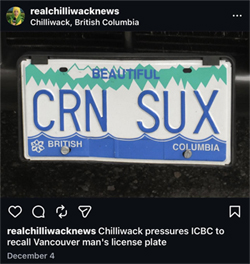|
A Media Guide for new "Personalized Number Plates" stories |
|||||||||||||||||||||||||||||||||||||||||||||||||||||||||||||||||||||||||||||||||||||||||||||||||||||||||||||||||||||||||||||||||||||||||||||||||||||||
Quick Links: |
We here at BCpl8s.ca appreciate when the major media outlets in the province take an interest in license plates and put resources into running a story on them. Often, this results in the publication of information that we have been unsuccessful in prying loose from the Corporation ourselves, and also exposes the world of license plates to a much broader audience. |
That said, we are concerned that media coverage of license plates over the past few years has become somewhat repetitive and predictable. Namely, the tendency to re-visit stories on personalized license plates and the slogans that ICBC has been rejecting. |
A classic case in point (and the one which drove us to create this page) is a 2016 segment by Global News entitled "Squire's take on vanity license plates": |
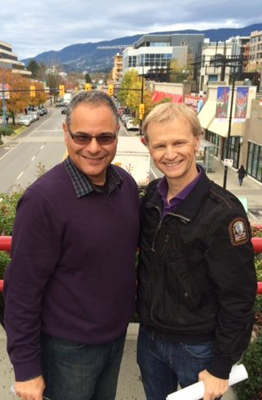 |
|
Sam Corea (left) and Squire Barnes (Right). |
As can be seen in the following assortment of headlines (some of which are still active links), "Squire's take" was not that original and treaded over some very familiar ground that the print media has covered numerous times since 2007: |
 |
We would like to thank the good folks at ICBC for sharing with us their lists of rejected personalised licence plate slogans. A word of caution for the easily offended, there may be some words in these lists that you may find, well ... offensive. But what kind of an "offensive" slogan lists would they be if they didn't offend. |
|
|||||||||||
Now, we understand the disruptive nature that the internet is having on so-called "legacy media" companies and the pressure this is putting on budgets for investigative reporting. So, in our own little way, we would like to help-out by offering some suggestions for any reporter thinking of running a future story on personalised license plates in BC and who might be looking for a new angle for their story. |
| Alternate Story Suggestion No. 1: Why are personalized plates so unpopular in BC? |
Lets start with the statement made by ICBC Spokesman Sam Corea in "Squire's take" that "on our roads right now we have 15,000 plates, so it's a popular program [emphasis added]..." |
This is patently false. The number of personalised plates in British Columbia has been stalled at 15,000 since the 1980s, and when growth in vehicle ownership numbers over the past 30 years is taken into account, the program has actually declined precipitously in popularity. |
How much has it declined? Well, available data indicates that there were 1,640,895 vehicles registered in 1984 versus 3,373,000 in 2014. By our estimate, that's an increase of 105.6% in registered vehicles, but a decline in the popularity of personalized license plates by -47%. |
Another way to look at it is 15,000 personalized license plates in 1984 would have been 0.91% of all registered vehicles in the province, whereas by 2014 the number would be a mere 0.44% of all eligible vehicles. |
How unusual is this number? Consider that a 2005 study found that the US average was 3.83%, while in 2006 Stats Canada reported the Canadian average to be 2.94%. The state with the highest number of personalized plates in 2007 was Virginia at 16.19% while the province with the most personalized plates was Ontario at 4.59%. |
Even more damning, in 2007 British Columbia ranked second last at 0.59%, only slightly ahead of Texas' 0.56% in terms of percentage of vehicles with vanity license plates. In the intervening decade, British Columbia has slipped further to only 0.44% while Texas revolutionized its vanity plate program and is now seen as one of the most innovative jurisdictions for vanity plates on the continent. |
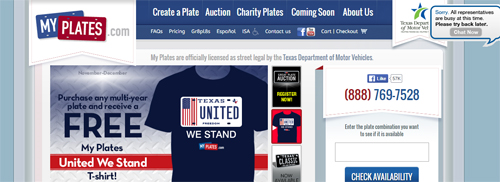 |
After finishing dead last in a survey of vanity license plates in North America conducted by the American Association of Motor Vehicle Administrators (AAMVA) in 2007, Texas privatised is vanity/specialty license plate program. The new vendor, MyPlates (an Australian company), overhauled the entire system brining in such obvious customer service improvements as on-line ordering and checking of slogan availability, new designs, auctions, 7 character slogans and variable pricing! Just check out that snazzy web page they have (at left)! |
One of the main reasons behind the failure of the personalized license plate program has been its mis-management by the provincial government. |
The original purpose of the PNP Program was to raise funds for the provincial government, yet, the government takes all the monies generated for the program and places it into general revenues (for use on other priorities such as health and education). |
Consequently, the Corporation is left with no funds to promote or invest in the PNP Program, and is further presented with a very strong disincentive to raise funds to do so as this would require an increase to basic rates (which is politically unpopular) while any additional monies generated through better marketing or innovative options would simply be scooped up by the provincial government. Consequently, the PNP Program has been left to languish. |
Not all is lost, however ... the previous popularity of the Olympic specialty plate (2007-12) seems to suggest that there is a pent up demand for more creative ways to express oneself on a license plate and, when properly managed and funded, British Columbia driver's have responded. |
| Alternate Story Suggestion No. 2: Who are the vainest drivers in BC? |
A simple yet high impact story; who are the vainest drives in the province? Could it be Vancouverites? Maybe Victorians? Is there a black horse lurking out in the Kootenay's somewhere (Nelson or Castlegar)? |
The Corporation maintains data on types of license plates issued by community (see the data they released in 2016 in relation to Collector plates which was used to proclaim Langley the hot rod capital of the province) and while we here at BCpl8s.ca have made a request for this in relation to personalized license plates, ICBC has informed us that this would take a while to prepare and they are back-logged with other requests. |
Possibly one of the main media companies might have more success prying this information lose (you have in the past!). |
| Alternate Story Suggestion No. 3: Should ICBC be censoring plates? | |||||
As was seen in the headlines posted above, most features on personalized license plates over the past decade have focused on the censorship actions of the Corporation - but only on a superficial level. For instance, the media has never asked if ICBC's actions in dispatching hundreds of slogans a year are consistent or legal. |
|||||
In one of the finest pieces of reporting we have ever seen on a personalized license plate program, the American Civil Liberties Union (ACLU) of Colorado obtained records from the state DMV for approved as well as rejected slogans in that state and did a comparison. The results speak for themselves: |
|||||
|
|||||
Taking inspiration from this approach, new story option No. 3(a) would be to ask the Corporation for a list of those slogans approved between 1987 to 2016 (keeping in mind the rejected slogans for these years are already posted above) and do a simple comparison to see what might reveal itself. |
* * * * * |
|
There are enough fans of the classic Seinfeld episode "The Fusilli Jerry" (S6:E21 - 1995-04-27) that ICBC has had to reject the "ASSMAN" slogan on at least three separate occasions (if not more). Despite being denied on the basis that it is "offensive" and "suggestive" the Corporation appears to have had no qualms allowing "MR BUTT" which, to us here at BCpl8s.ca is a tautology of "ASSMAN" - is it not?
|
|
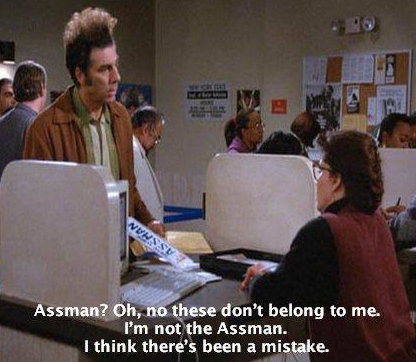 |
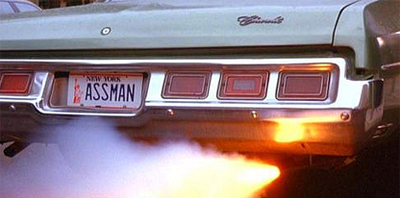 |
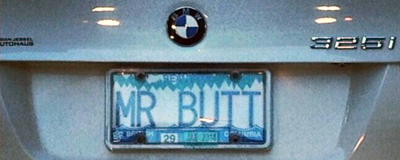 |
|
In the 2014 Vancouver Sun column "4 PLAY the most commonly rejected vanity plate in B.C." reference is made to the slogan "NEWFIE" being rejected a dozen different times between 1987 and 2013. Well, cast your eyes on the plate below! In addition, the column included a number of mock-ups of other rejected slogans, including "TOPLES". Well, well ... |
|
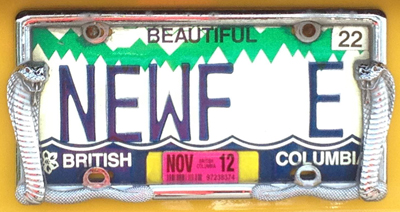 |
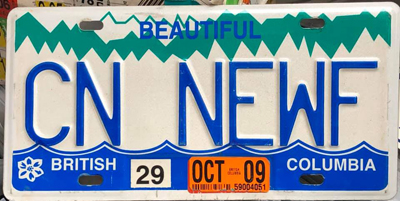 |
| Pictured at top-left is the plate "NEWF E", which is apparently acceptable to ICBC as a slogan whereas the more correct spelling of "NEWFIE" has been rejected a dozen times between 1987 and 2013. At right is a variation of "NEWF" deemed appropriate by ICBC. | |
In addition to the "NEWFIE" / "NEWF E" example above, the Sun's column included a number of mock-ups of other rejected slogans, including "TOPLES". Well, well ... |
|
.jpg) |
|
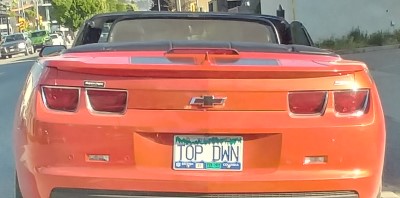 |
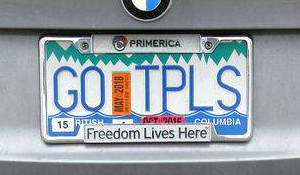 |
Clockwise: A rendering made by the Vancouver Sun to show an example of a "TOPLES" slogan rejected by ICBC. The actual plate "TOPLES" which was issued by ICBC despite being deemed an offensive slogan. Why the change in heart at the Corporation is unknown, but why stop at merely stating "TOPLES" when you can advocate "Going Topless" (GO TPLS). We especially like the license plate frame that is doubling down on the freedom of going topless! Finally, someone who has there Top Down (TOP DWN). |
|
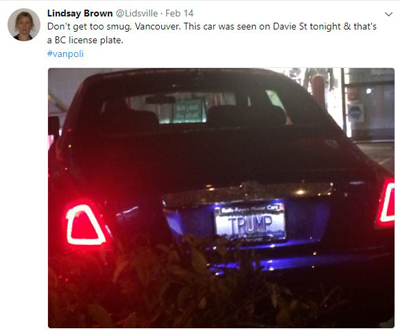 |
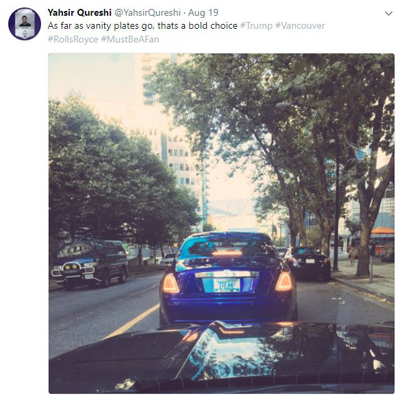 |
In early 2017, images of a "TRUMP" vanity plate on a blue Rolls Royce Bentley started to appear on social media. This was followed shortly thereafter by sightings of "TRUMP2" (but no sightings, yet, of "TRUMP1"). |
|
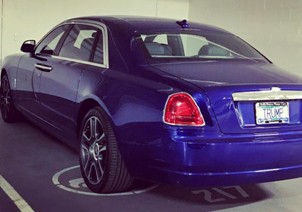 |
.jpeg) |
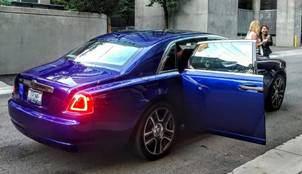 |
|
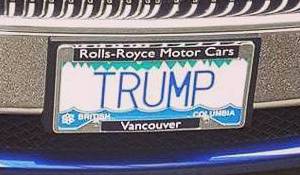 |
By the fall of 2017, the "TRUMP" plates were capturing more attention on social media and the connection was made with the Trump International Hotel & Tower at 1161 West Georgia, Street. |
While we appreciate that many companies as well as individuals display their names on personalised plates, and that ICBC (and the MVB before it) have struggled to navigate the pratfalls of these names (see "HOOKER" back in the 1980s), the decision to issue "TRUMP" plates is particularly baffling. |
First, it was our understanding that the Corporation had a long history of refusing slogans deemed to be political in nature (i.e. Rejection Code "U08") and had previously rejected the following: |
|
 |
 |
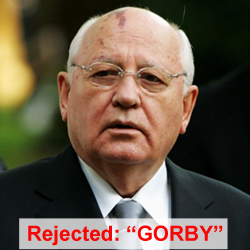 |
 |
How then did ICBC conclude that "TRUMP" was not a political slogan and was deemed appropriate for use on a vehicle? Especially after the name of the building was protested following the US presidential election in November of 2016 when the Mayor of Vancouver, Gregor Robertson, called for the Trump name to be removed! |
To place the "TRUMP" slogan in a broader context, we note that the highest profile license plate flap in the Canada in 2017 involved the revocation of the slogan "GRABHER" by the Nova Scotia Motor Vehicle Registry due to its Trumpian overtones. In June 2017, JCF Capital reached an agreement with Trump Hotels in order to remove the Trump name from a tower in Toronto, raising questions in the local Vancouver press about why the name persisted in this city. |
* * * * * |
New story No. 3(b) would be to see if ICBC's censors are acting within their mandate. For instance, ICBC's authority to perform its censorship role is drawn directly from Sections 34.04(d) & (e) of the Motor Vehicle Act Regulations, specifically. |
|||
|
|||
Recall that in "Squire's take", ICBC Spokesperson Sam Corea ran through the common categories that the Corporation relies on when rejecting slogans, including "03" which is for offensive slogans, "04" for suggestive slogans, "05" for slogans not in good taste, "09" for slogans related to alcohol or drugs and "13" which is for speed or racing slogans (the full list can be accessed; HERE). |
|||
Generally, these categories can be linked back to Section 34.04(d), but in what alternate universe are speed and racing slogans deemed "offensive" to anyone other than an insurance agent working for the Corporation? |
|||
We believe that any suggestion that speed racing slogans "might distract the drivers of other vehicles" strains credulity, and highlights a more worrisome question; what else has ICBC deemed "offensive" simply because it might conflict with its corporate mandate? |
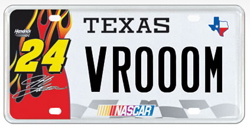 |
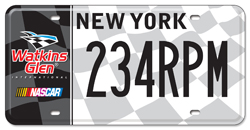 |
While ICBC may consider it perfectly normal to reject "NSCR 3" (a reference to the late Dale Earnhardt) three times (naturally) in 2011, "RPM RCN" and "SMOKE" (really ICBC, "SMOKE"?!?!) on the basis that they are speed related and therefore "offensive", a number of US states not only allow such slogans (see the Mississippi Earnhardt No. 3, Texas "VROOOM" and New York "RPM" plates at left) they also directly promote NASCAR and racing scenes on specialty license plate bases. All, apparently, without anyone being offended or any discernible impact on road safety in these jurisdictions. |
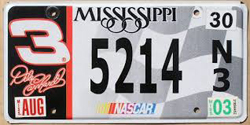 |
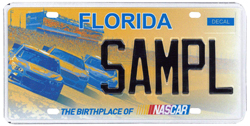 |
Unlike other jurisdictions, the Corporation does not rely on a committee with representation from outside the organisation, nor does it produce its list of banned slogans so people might know what not to waste their time on. Of even more interest, has anyone ever appealed to the Corporation's Fairness Commission regarding a rejected slogan and how are those cases handled? |
| Entrenched media habits ... |
The basis of the story was a study of all the slogans ICBC has rejected from 2016 to 2018 (surprise!). |
Without belabouring our disappointment with this column (Oh, the calamity ...), a couple of statements warrant review, including: |
|
As we have outlined above, personalised license plates are a failed policy program in this province and British Columbians are clearly not in love with these types of plates. |
The "TRUMP" slogan has been issued not once, but twice by ICBC (i.e. "TRUMP 2" exists as well), a fact that is easily confirmed by doing a simple Twitter search. |
While ICBC might have a problem with "BIGEVIL", it has no problem with "BE EVIL" or "EVIL SC" (both of which has been issued and photographed in the wild). An expanded FOI request that included approved slogans might have revealed this inconsistency. |
We agree "GOLEAFS" is a reprehensible slogan on a BC license plate but it was not rejected because it contravenes some kind of community norm. No, the real reason is a slogan can't be more than 6 letters and, well, "GOLEAFS" is 7 letters. If ICBC could issue a 7 letter slogan, "GOLEAFS" would be a slam dunk given "GO FLMS" & "GO JETS" have previously been approved. |
* * * * * |
On December 20, 2020, CTV News in Vancouver decided to ask ICBC for a list of all the rejected slogans in BC for the previous year. As this information had not yet been compiled, CTV was provided with a list from 2019, which they dutifully published the highlights of to their web-site with no context as to why the slogans were refused or questioning of some of ICBC decisions. |
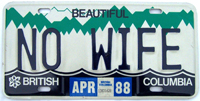 While some of the decisions are obvious, such as the slogan comprising 7 characters ("SPECTRE"), for slogans that are already known to have been issued ("LOL OIL"), or were all numeric ("2020"), others were questionable, such as the continued refusal to issue ASSMAN (desite allowing MR BUTT - see above) and "NO WIFE" - which was previously issued. While some of the decisions are obvious, such as the slogan comprising 7 characters ("SPECTRE"), for slogans that are already known to have been issued ("LOL OIL"), or were all numeric ("2020"), others were questionable, such as the continued refusal to issue ASSMAN (desite allowing MR BUTT - see above) and "NO WIFE" - which was previously issued. |
| On May 23, 2022, CTV News in Vancouver decided to return to the topic of personalised license plates and was able to obtain from ICBC lists of the rejected slogans in 2020 and 2021, and ran a story on it during their nightly news broadcast: |
This is a much better entry than their 2019 story on personalized plates, but we would have like to see the Corporation grilled on some of their decision-making, particularly the inconsistencies in which slogans are allowed versus rejected. |
We here at BCpl8s.ca were subsequently able to obtain the same rejection lists from ICBC and have linked them above (see the top of this). |
| Dr. Sex |
In fairness, we do want to credit CTV Vancouver for taking up the cause of Dr David Hersh, a sex therapist, in November of 2010 when he went public with his complaint about ICBC determining that his request to have the slogan "DR SEX" on his plate "might be offensive to some people". |
The broadcaster went to so far as to create its own mock-up of Hersh's requested "DR SEX" slogan and proceeded to ask people in it "Voice on the Street" segment - essentially challenging the Corporation's assumptions regarding where community values and sensibilities might lie on this slogan! |
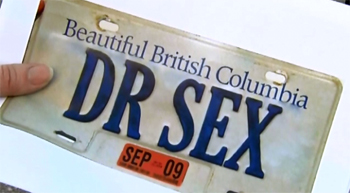 |
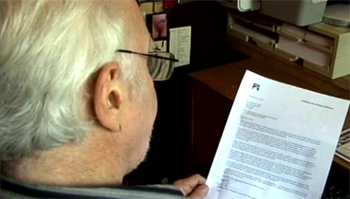 |
|
We'll excuse CTV News for using the regular passenger base for their mock-up and not the PNP base! |
Dr David Hersh reading the rejection letter sent to him by ICBC advising that he would not be receiving his "DR SEX" slogan. |
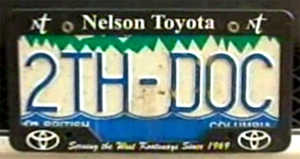 In media reports, Hersh stated that ICBC was being ridiculous and that "this opinion has to do with morality. They talk about reducing drivers' level of attention and care because they see the word 'sex' on a licence plate. Well, we've seen lingerie ads on the freeways". He further offered that he was "offended by the morality and the Victorian attitudes, so frightened of the word sex". He also pointed out that "there is a guy here in town who is a dentist and his licence plate is '2TH DOC' - tooth doc. So why is his part of the body OK and mine is not OK?" In media reports, Hersh stated that ICBC was being ridiculous and that "this opinion has to do with morality. They talk about reducing drivers' level of attention and care because they see the word 'sex' on a licence plate. Well, we've seen lingerie ads on the freeways". He further offered that he was "offended by the morality and the Victorian attitudes, so frightened of the word sex". He also pointed out that "there is a guy here in town who is a dentist and his licence plate is '2TH DOC' - tooth doc. So why is his part of the body OK and mine is not OK?" |
Even more exciting, Hersh announced that he would be engaging the services of a lawyer to press his case with the censors at ICBC - which would have been fantastic had he actually followed through on it, as it is our understanding that the Corporation's censoring activities with regard to plate slogans have never been tested in court (especially as they relate to "speed racing" terminology which is probably only offensive to ICBC as a public insurer. Alas, nothing more was heard from Mr Hersh on this subject ... |
| Dr Sex - better luck elsewhere: | |
.jpg) It would seem proclaiming that you are a Sex Doctor on your license plate in Missouri, while not a slam dunk, can be successful upon appeal! In 2013, the Show-Me state had to contend with a very similar application to that made by David Hersh in BC, albeit for a slightly different iteration of "SEX DOC". And, lo and behold, the plate was approved following an administrative tribunal attended by lawyers on both sides. It would seem proclaiming that you are a Sex Doctor on your license plate in Missouri, while not a slam dunk, can be successful upon appeal! In 2013, the Show-Me state had to contend with a very similar application to that made by David Hersh in BC, albeit for a slightly different iteration of "SEX DOC". And, lo and behold, the plate was approved following an administrative tribunal attended by lawyers on both sides. |
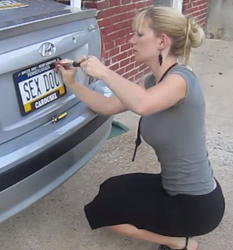 Around the same time (2011-13), Jill McDevitt, a "sexologist" in Pennsylvania applied to have "SEX DOC" as the slogan on her license plate. Denied multiple times, McDevitt was ultimately successful in obtaining the slogan by cannily pointing out to the Penn. DMV the numerous other plates with sex themes that had already been issued by the state (i.e. "HARDIK", "BIG SAK", "CAML TOE" & "VAHJAYJ). Photo evidence also certainly helped. Around the same time (2011-13), Jill McDevitt, a "sexologist" in Pennsylvania applied to have "SEX DOC" as the slogan on her license plate. Denied multiple times, McDevitt was ultimately successful in obtaining the slogan by cannily pointing out to the Penn. DMV the numerous other plates with sex themes that had already been issued by the state (i.e. "HARDIK", "BIG SAK", "CAML TOE" & "VAHJAYJ). Photo evidence also certainly helped. |
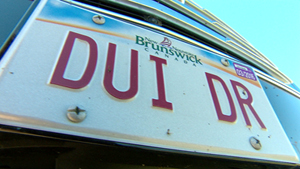 Important in a Canadian legal context, New Brunswick lost a case in 2016 in which it attempted to revoke personalized plates that displayed the slogan "DUI DR" on the basis that their actions breached basic procedural fairness and was unreasonable because there was no evidence presented to provide a basis for the decision. We find this last part of the decision of particular interest in the context of how ICBC chooses to make its decisions. For instance, does reference to an arbitrary code (i.e. "13" for speed racing) provide a reasonable basis for a decision? Important in a Canadian legal context, New Brunswick lost a case in 2016 in which it attempted to revoke personalized plates that displayed the slogan "DUI DR" on the basis that their actions breached basic procedural fairness and was unreasonable because there was no evidence presented to provide a basis for the decision. We find this last part of the decision of particular interest in the context of how ICBC chooses to make its decisions. For instance, does reference to an arbitrary code (i.e. "13" for speed racing) provide a reasonable basis for a decision? |
|
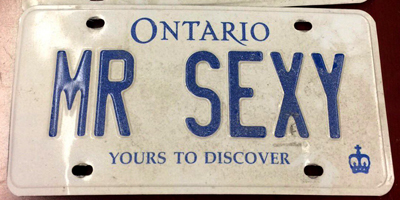 In February of 2019, a 17-year old was pulled over by Ontario Provincial Police (OPP) driving a stolen Maserati doing 150 km an hour in Missasauga. Of interest, the kid had attached stolen license plates to the Maserati that read "MR SEXY"! Why is this interesting? Ontario maintains similar guidelines as BC regarding inappropriate slogans such as those that might be "sexual" (i.e. "messaging or meaning" and "sexual and eliminatory functions" - we had to look that last one up) or "abusive, obscene language and derogatory slang". In this case, not only had the Ontario government issued the plates without apparent concern for the community being offended but were even trying to return the plates to the person who they had been stolen from (funny they wouldn't know who that was?). In February of 2019, a 17-year old was pulled over by Ontario Provincial Police (OPP) driving a stolen Maserati doing 150 km an hour in Missasauga. Of interest, the kid had attached stolen license plates to the Maserati that read "MR SEXY"! Why is this interesting? Ontario maintains similar guidelines as BC regarding inappropriate slogans such as those that might be "sexual" (i.e. "messaging or meaning" and "sexual and eliminatory functions" - we had to look that last one up) or "abusive, obscene language and derogatory slang". In this case, not only had the Ontario government issued the plates without apparent concern for the community being offended but were even trying to return the plates to the person who they had been stolen from (funny they wouldn't know who that was?). |
|
| FIVE-O |
This despite the slogan having been issued almost a decade earlier, remaining in continusous use for that period and, importantly, not being the subject of a complaint to the Corporation.
As explained by a Corportation spokesperson, ICBC periodically reviews personalized licence plates to ensure they meet program guidelines, which include restrictions to referencing law enforcement, religion, politics, public figures or dignitaries, and the reference to law enforcement wasn't caught when the customer applied for it. While it is understood that the Corporation will regularly update its list of banned words based on societal changes regarding what may be newly offensive, it is less well known or understood how often ICBC updates its categories of what is considered offensive. Fortunately, we previously archived a list of "Rejection Codes" provided by the Corporation and which are used to explain a decision to reject a slogan. At the time, these included categories such as "offensive", "suggestive", "not in good taste", "religious connotations", "registered trademark" and everyone's favourite (and highly questionable) "speed / racing related". No where on this list is a reference to "law enforcement" and if that extends to slang for law enforcement, such as "Five-O". Which, we might add, is very Baby Boomer centric to a bad 1960s TV show and is, according to Wikipedia also a "non-derogatory" reference to the police. We can only assume "law enforcement" is a new "Rejection Code" or ICBC is taking liberities (again) with its statutory authority, which only extends, under Section 34.04 of the Motor Vehicle Act Regulations (and is re-printed above). |
The only indication that a reference to a Law Enforcement Official might be "objectionable" is found on the Corporation's website (2025), wherein it is stated that the following is so deemed:
|
It would have been intertesting if this decision to recall the "FIVE-O" slogan had been appealed to the Corporation's in-house ombudsperson and what the outcome would have been. But alas. We are going to see if we can shake loose any further information on this decision and if there is an updated "Rejection Codes" list. Stay tuned! |
Quick Links: |
Antique | APEC | BC Parks | Chauffeur Badges | Collector | Commercial Truck | Consul | Dealer | Decals | Driver's Licences | Farm | Ham Radio | Industrial Vehicle | Keytags | Lieutenant Governor | Logging | Manufacturer | Medical Doctor | Memorial Cross | Motive Fuel | Motor Carrier | Motorcycle | Movie Props | Municipal | National Defence | Off-Road Vehicle | Olympics | Passenger | Personalized | Prorated | Prototype | Public Works | Reciprocity | Repairer | Restricted | Sample | Special Agreement | Temporary Permits | Trailer | Transporter | Veteran | Miscellaneous |
© Copyright Christopher John Garrish. All rights
reserved.

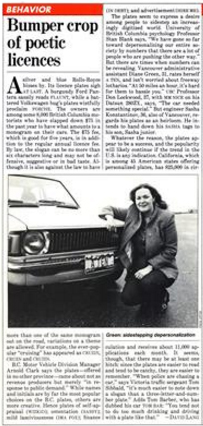
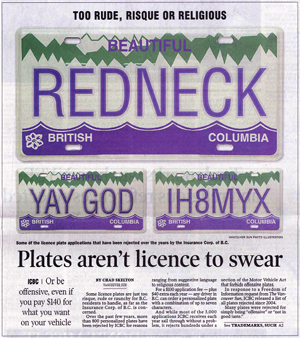


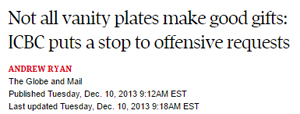




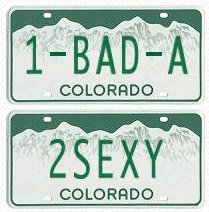
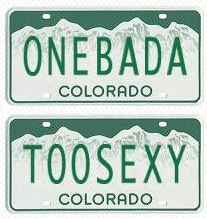
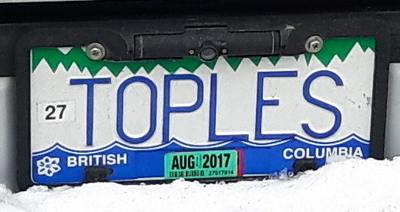
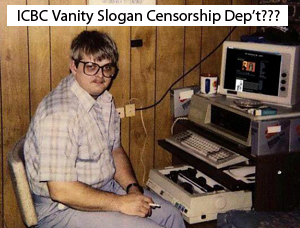 Recent media reports have also failed to delve into the system ICBC uses to vet license plate slogans. It might surprise people to know that decisions regarding all slogans are generally made by a single staff member sitting in front of a computer screen punching combinations into the Urban Dictionary, the Corporation's own in-house database while also reading the tea leaves at the bottom of their coffee cup (on that last one, I am kidding - kinda).
Recent media reports have also failed to delve into the system ICBC uses to vet license plate slogans. It might surprise people to know that decisions regarding all slogans are generally made by a single staff member sitting in front of a computer screen punching combinations into the Urban Dictionary, the Corporation's own in-house database while also reading the tea leaves at the bottom of their coffee cup (on that last one, I am kidding - kinda). 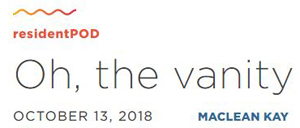
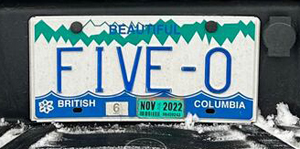 In December of 2025, it was reported that ICBC was recalling a personalised licence plate displaying the slogan "FIVE-O" on the basis that it was a prohibited slogan due to it being a reference to law enforcement.
In December of 2025, it was reported that ICBC was recalling a personalised licence plate displaying the slogan "FIVE-O" on the basis that it was a prohibited slogan due to it being a reference to law enforcement.
